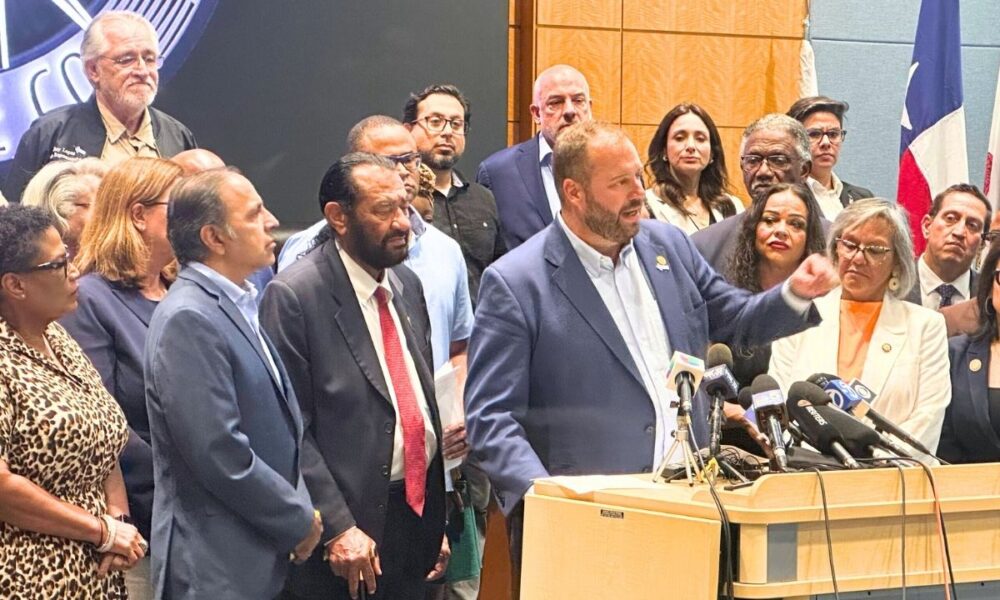More than 50 Texas House Democrats fled the state on August 3 to block a Republican‑backed redistricting plan they say would weaken minority voting power in cities like Dallas, Houston, and Austin.
In response, Gov. Greg Abbott, aided by a GOP‑controlled committee, moved swiftly to escalate penalties—threatening removal from office, issuing civil arrest warrants, and accusing the absent lawmakers of having “forfeited their seats” by abandoning their legislative duties.
The quorum break has stalled legislative business in Austin, drawing comparisons to past walkouts by both parties, including an 1870 Republican break that triggered the so-called “Rump Senate” and a 2021 Democratic flight to Washington, D.C., to block an election reform bill.
The latest standoff comes with control of the U.S. House closely divided, 219 Republicans to 212 Democrats, with four vacancies, and a potential five-seat pickup for Republicans in Texas alone if their strategy succeeds.
What is a quorum?
A quorum is the minimum number of lawmakers required to conduct official business.
In Texas, a quorum represents the following:
- House: 100 of 150 members (two-thirds)
- Senate: 21 of 31 members (two-thirds)
What happens if a quorum is broken?
Under House rules, absent members can face:
- $500 fine per day
- Repayment of costs to track them down
- Reprimand or censure
- Expulsion
Why Democrats deserted their responsibilities
- To block GOP redistricting maps, they say, dilute minority votes in Dallas, Houston, and Austin.
- Republicans say the maps are legal and would add five GOP-leaning U.S. House seats — a potential cushion in the current 219–212 balance.
History of walkouts in Texas
- 1870: 13 Senate Democrats and three conservatives fled to block a militia bill. They were arrested, and the “Rump Senate” eventually passed it anyway.
- 2021: House Democrats fled to Washington, D.C., to block a GOP election bill. A COVID outbreak among members marked the trip.
National ripple effect
- Governors in California and New York are considering mid-decade redistricting if Texas moves forward, though both face legal hurdles.
- The move comes amid national fights over gerrymandering after the Supreme Court ruled in 2019 that partisan redistricting is a political — not judicial — question.
The gamble for Republicans
- The maps increase Hispanic voting share in three of the five targeted districts.
- Republicans are betting Hispanic voters will keep trending right, as in 2024 when Trump flipped several border counties.
- If the trend stalls, the seats could become costly to defend.
Texas House Speaker Dustin Burrows has already suspended direct deposit for absent members, requiring them to collect their paychecks in person, and Gov. Greg Abbott has asked the Texas Supreme Court to remove Minority Leader Gene Wu from office over the defiance.
Attorney General Ken Paxton has warned he will pursue court orders to compel absent Democrats back to the Capitol, and Abbott has threatened that if the boycott continues, Republicans could expand their map to create six, seven, or even eight new GOP-leaning districts. The special session ends August 19, and Democrats have signaled they intend to remain out of state until then, which would deny the House a quorum for its entire duration.
Some Democrats are in Illinois; others are in California, where they reportedly plan to appear alongside Gov. Gavin Newsom and House Speaker Emerita Nancy Pelosi in a show of solidarity. Newsom has floated a possible statewide ballot measure to give California the ability to redraw its congressional map if Republican-led states like Texas change theirs mid-decade, as previously reported by The Dallas Express.
At a press conference on August 4 at an IBEW union hall west of Chicago, Democrats framed their absence as an act of principle, not avoidance.
“We are not on vacation,” said state Rep. John H. Bucy III. “I didn’t run for office to walk out of the Capitol, but sometimes the only way to uphold your oath is to refuse to play along with a rigged game.”
Democratic Caucus Chair Gene Wu called the move “a decision we make with absolute moral clarity,” alleging Abbott “is using an intentionally racist map to steal the voices of millions of Black and Latino Texans.”
Republicans have responded with civil arrest warrants for absent members and threats of additional penalties. Abbott has ordered the Department of Public Safety to locate the lawmakers and warned that accepting financial support to remain out of state could violate bribery laws.
Paxton said the Democrats are “spitting in the face of every Texan they swore to represent.”
Sen. John Cornyn, a Texas Republican locked in a competitive primary race with Paxton, said Thursday the FBI had approved his request to help locate the lawmakers. It is unclear what role federal agents could play, as no criminal warrants have been issued. NBC News reported that a federal official said there were no plans to use federal agents to arrest the lawmakers on the lam, as of Thursday morning.
The walkout has drawn national attention, with Democrats in California and New York openly exploring mid-decade redistricting in response to Texas, though both face legal and logistical hurdles that could delay any new maps until after the next election. Notably, both states have independent redistricting commissions, and Democrat-led efforts to redistrict in New York have previously reportedly backfired.
California Gov. Newsom said, “We’re going to fight fire with fire,” and New York Gov. Kathy Hochul vowed to explore “every option” to redraw lines, per The Hill.
Neither side has signaled a willingness to back down, with the special session clock running out in less than two weeks.
Editor’s note: This article includes additional reporting from Roy Maynard, Senior Copywriter and Founder of the Associated News Service.


